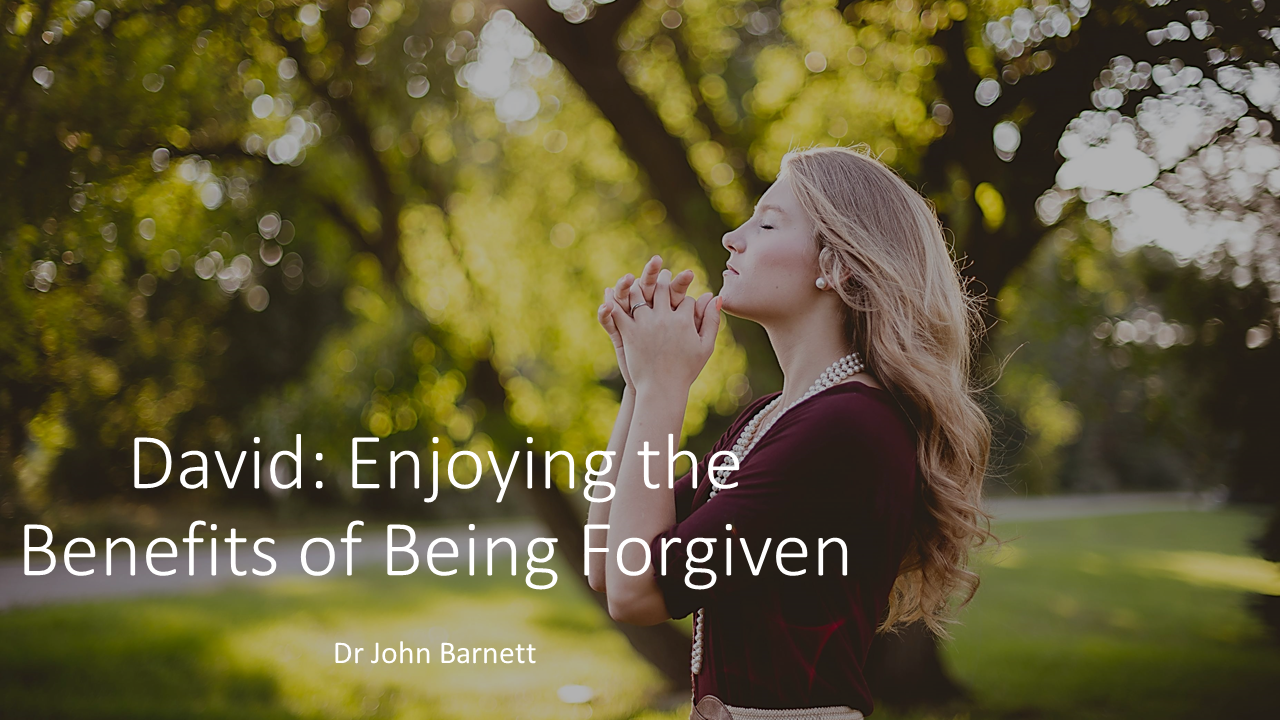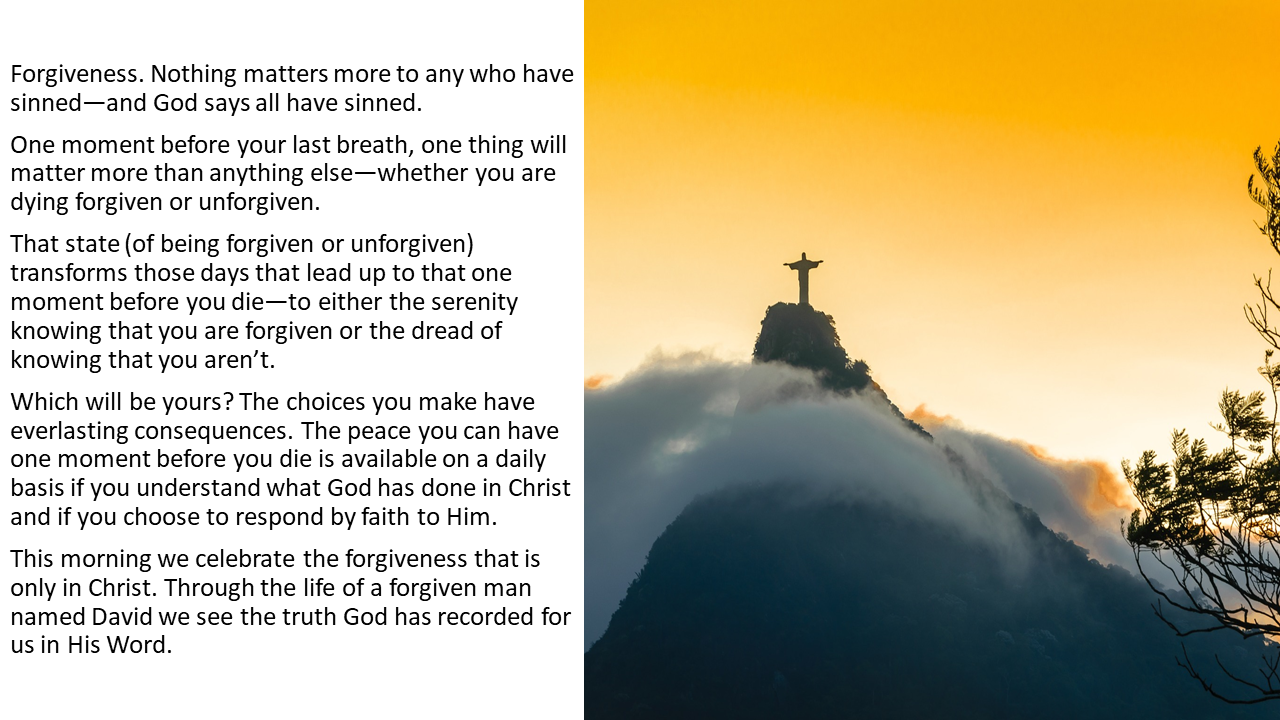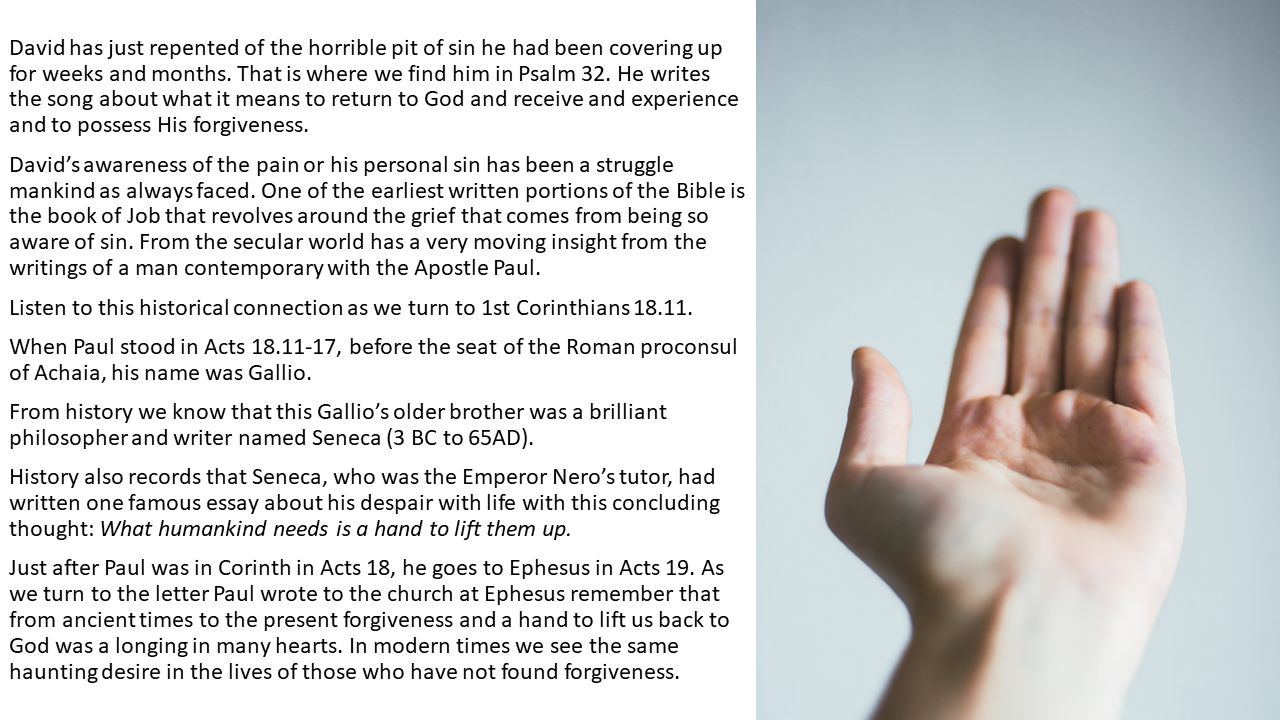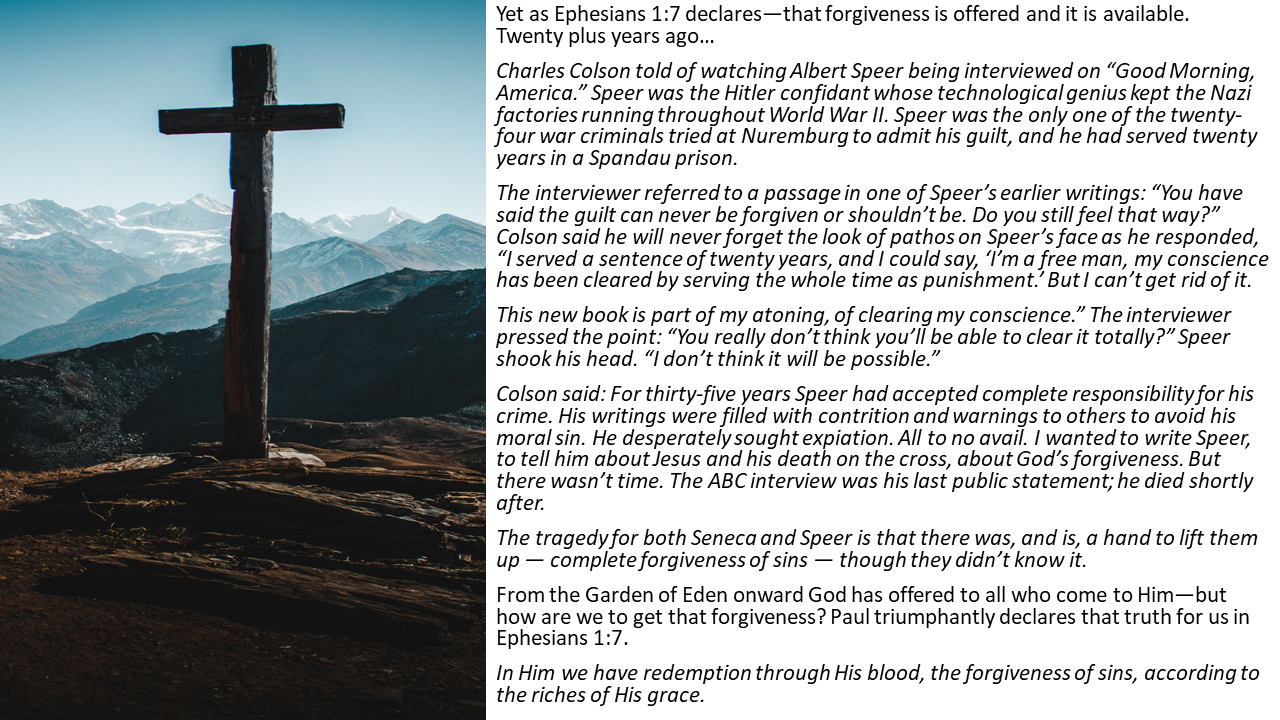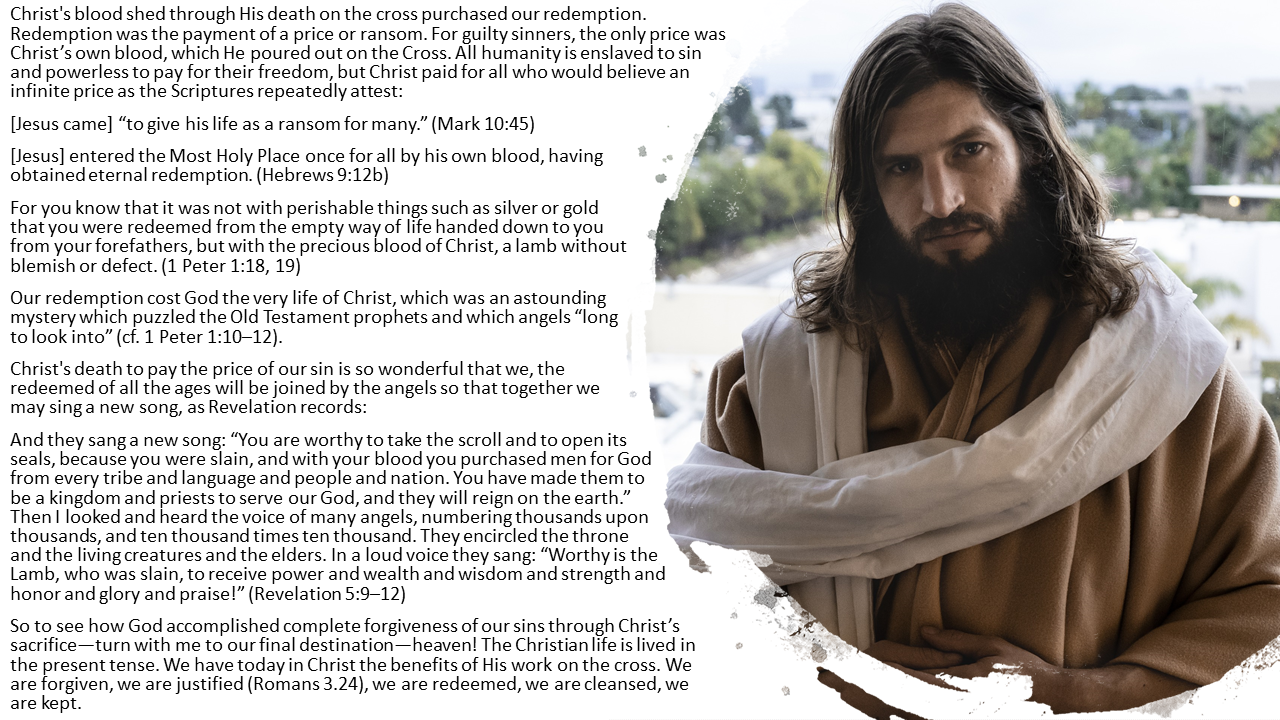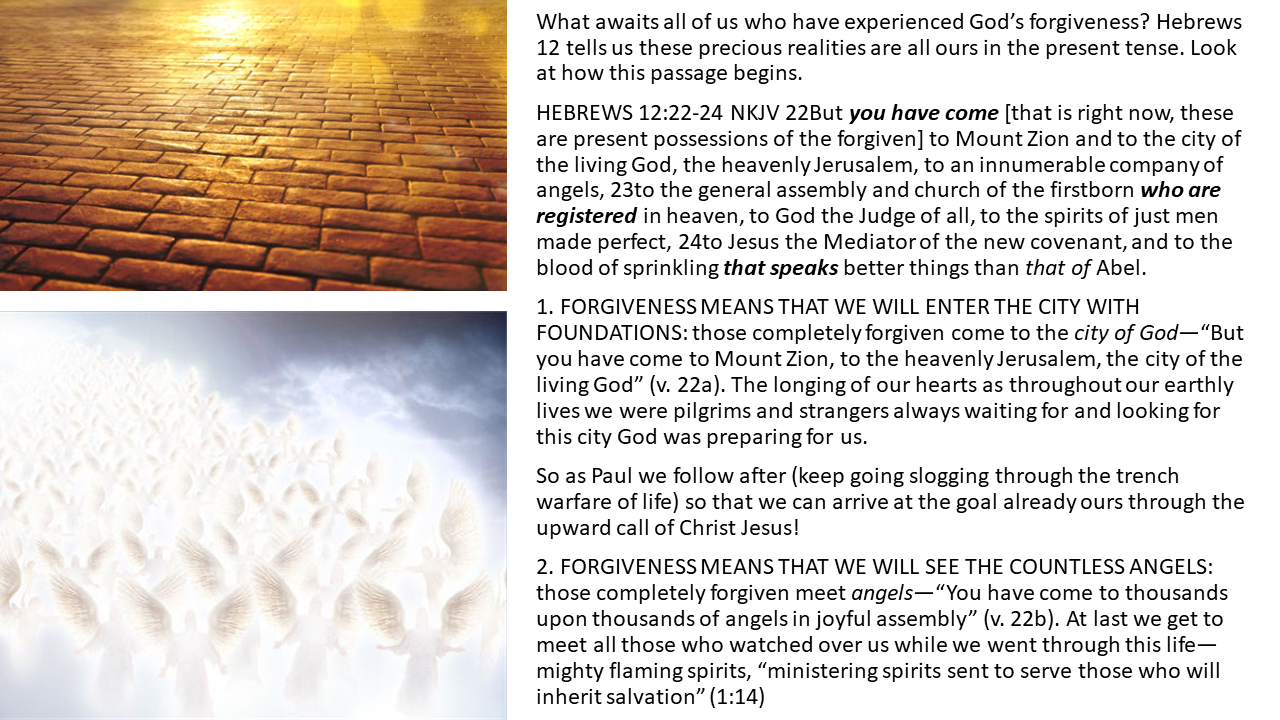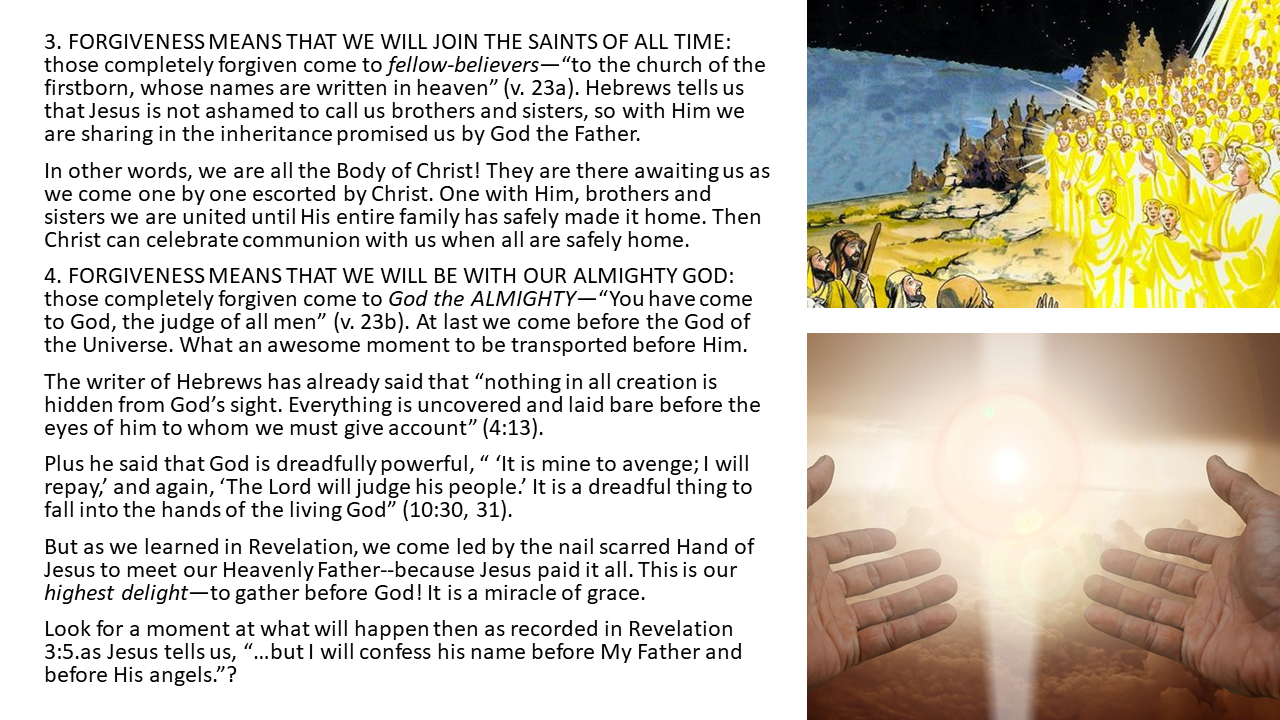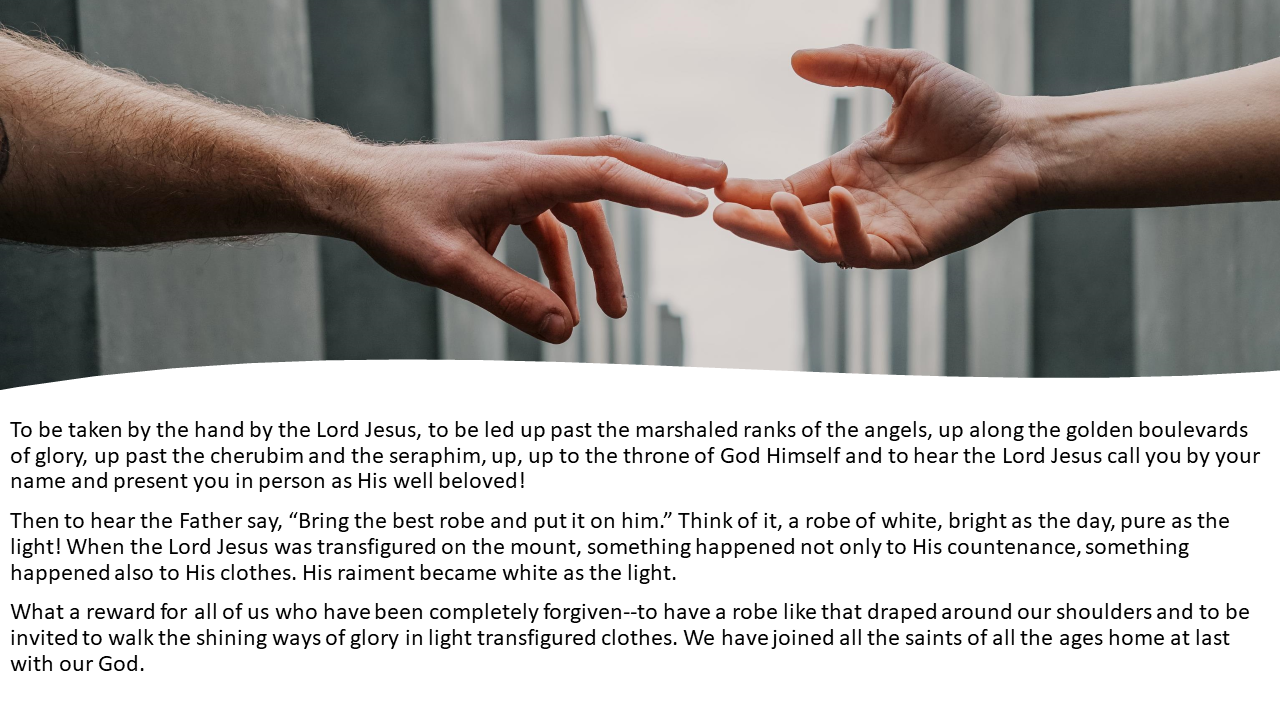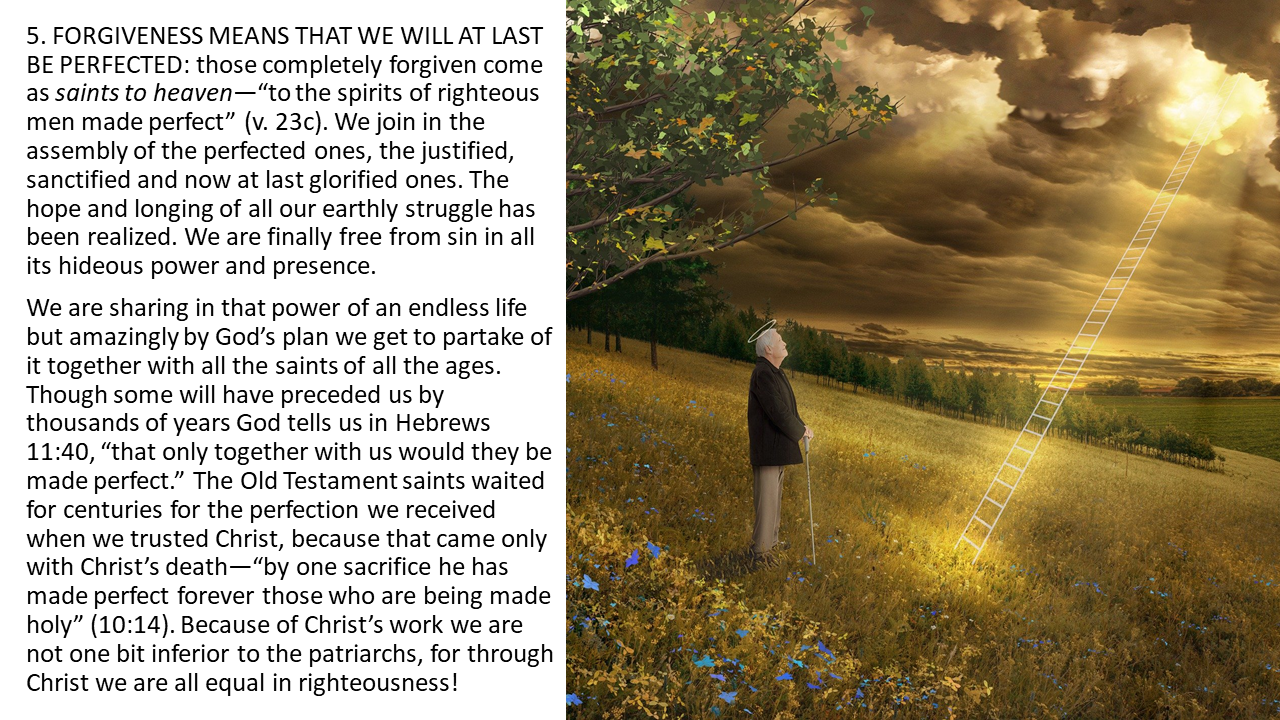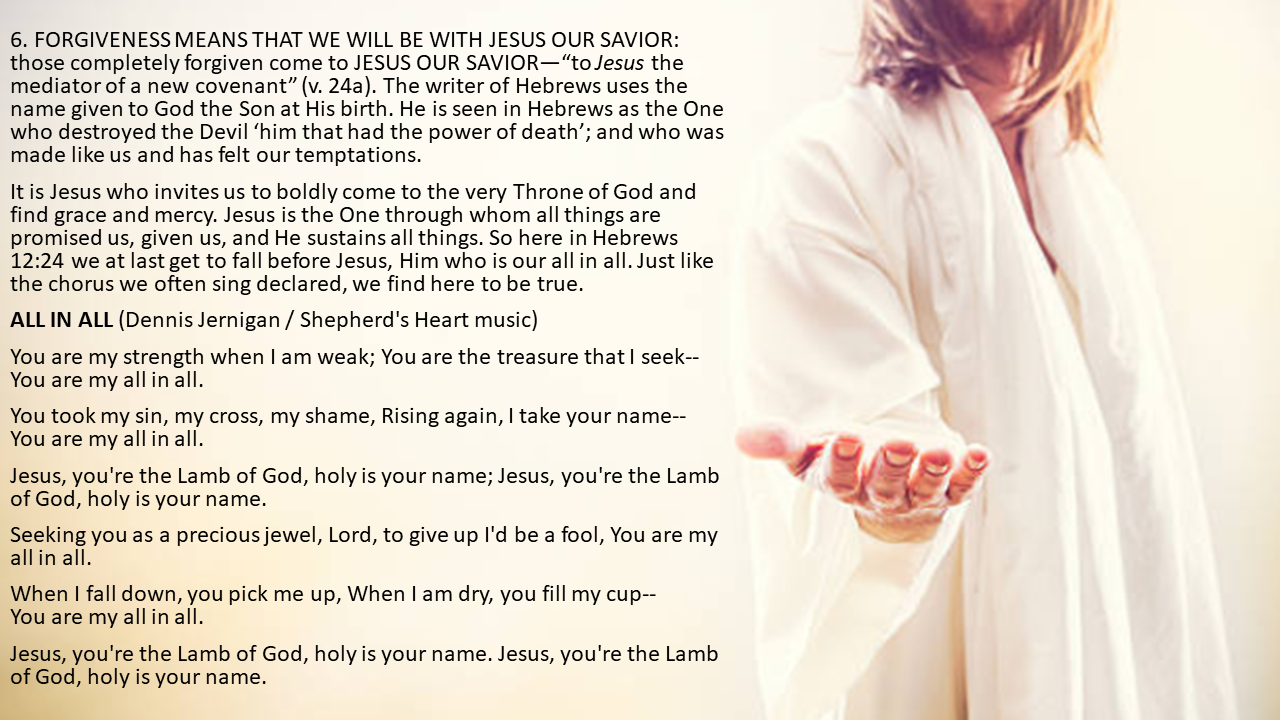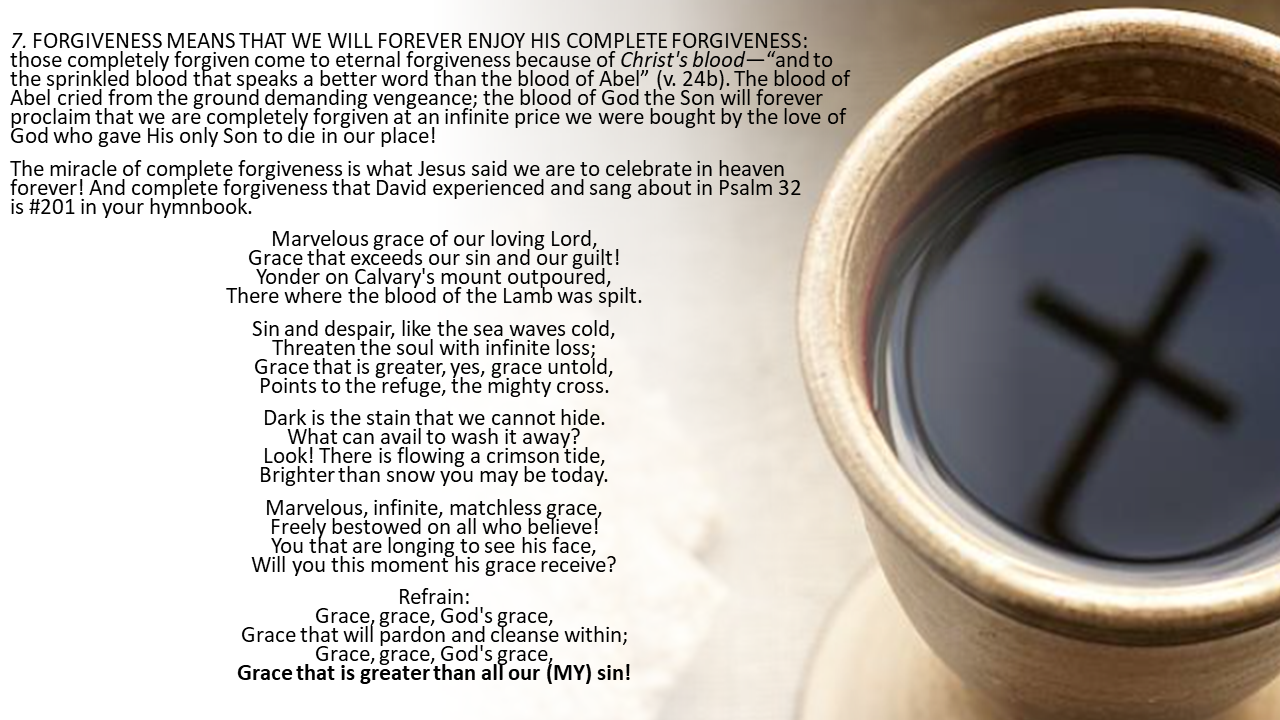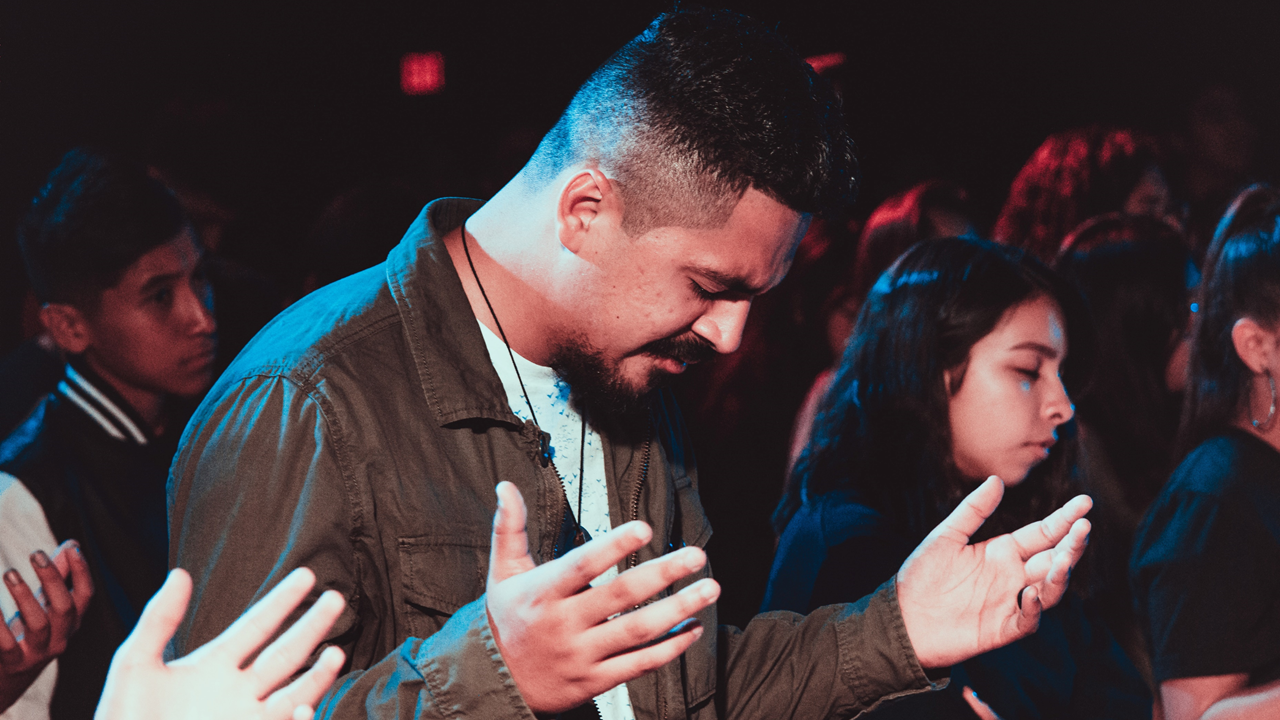If the YouTube video above is not available, here are two other ways to view:
Enjoying the Benefits of Being Forgiven
060716AM
DSS-25
PSALM 32
 Forgiveness. Nothing matters more to any who have sinned—and God says all have sinned.
Forgiveness. Nothing matters more to any who have sinned—and God says all have sinned.
One moment before your last breath, one thing will matter more than anything else— whether you are dying forgiven or unforgiven.
That state (of being forgiven or unforgiven) transforms those days that lead up to that one moment before you die—to either the serenity knowing that you are forgiven or the dread of knowing that you aren’t.
THE CHOICE WITH AN EVERLASTING CONSEQUENCE
Which will be yours? The choices you make have everlasting consequences.
The peace you can have one moment before you die is available on a daily basis if you understand what God has done in Christ and if you choose to respond by faith to Him.
This morning we celebrate the forgiveness that is only in Christ. Through the life of a forgiven man named David we see the truth God has recorded for us in His Word.
We are progressing through the life of David. David is the most written about man in the Bible. David gives us more material on the reality of personal forgiveness, personal assurance of cleansing and personal peace in spite of sin and failure—than anyone else in God’s Word.
Open again to the song David wrote for all the world to see his confident assurance that he was forgiven! David had a present, personal assurance of his complete forgiveness— that his guilt was past and his peace was secure. This morning we will focus on the first five verses. Note the present tense of God’s forgiveness.
Psalm 32:1-5 A Psalm of David. A Contemplation. (This marks the first1 of a dozen of these maskils that are so titled because they give a ‘teaching’ or ‘lesson’ that need to be ‘pondered’ or ‘contemplated’). This is also the second of the seven penitential Psalms2 or Psalms that speak of sorrow over sin. The 4th or middle of the seven is of course the greatest and most well known—the 51st Psalm.
Blessed is he whose transgression is forgiven, Whose sin is covered. Blessed is the man to whom the Lord does not impute iniquity, And in whose spirit there is no deceit. When I kept silent, my bones grew old through my groaning all the day long. For day and night Your hand was heavy upon me; my vitality was turned into the drought of summer. Selah. I acknowledged my sin to You, And my iniquity I have not hidden. I said, “I will confess my transgressions to the LORD,” And You forgave the iniquity of my sin. Selah
Pray
David has just repented of the horrible pit of sin he had been covering up for weeks and months. That is where we find him in Psalm 32. He writes the song about what it means to return to God and receive and experience and to possess His forgiveness.
OUR SHARED STRUGGLE WITH SIN
David’s awareness of the pain or his personal sin has been a struggle mankind as always faced. One of the earliest written portions of the Bible is the book of Job that revolves around the grief that comes from being so aware of sin. From the secular world has a very moving insight from the writings of a man contemporary with the Apostle Paul. Listen to this historical connection as we turn to 1st Corinthians 18.11.
• When Paul stood in Acts 18.11-17, before the seat of the Roman proconsul of Achaia, his name was Gallio.
• From history we know that this Gallio’s older brother was a brilliant philosopher and writer named Seneca (3 BC to 65AD).
• History also records that Seneca, who was the Emperor Nero’s tutor, had written one famous essay about his despair with life with this concluding thought: What humankind needs is a hand to lift them up.
Just after Paul was in Corinth in Acts 18, he goes to Ephesus in Acts 19.
As we turn to the letter Paul wrote to the church at Ephesus remember that from ancient times to the present forgiveness and a hand to lift us back to God was a longing in many hearts. In modern times we see the same haunting desire in the lives of those who have not found forgiveness.
Yet as Ephesians 1:7 declares—that forgiveness is offered and it is available. Twenty plus years ago…
Charles Colson told of watching Albert Speer being interviewed on “Good Morning, America.” Speer was the Hitler confidant whose technological genius kept the Nazi factories running throughout World War II.
Speer was the only one of the twenty-four war criminals tried at Nuremburg to admit his guilt, and he had served twenty years in a Spandau prison.
The interviewer referred to a passage in one of Speer’s earlier writings: “You have said the guilt can never be forgiven or shouldn’t be. Do you still feel that way?”
Colson said he will never forget the look of pathos on Speer’s face as he responded, “I served a sentence of twenty years, and I could say, ‘I’m a free man, my conscience has been cleared by serving the whole time as punishment.’ But I can’t get rid of it. This new book is part of my atoning, of clearing my conscience.” The interviewer pressed the point: “You really don’t think you’ll be able to clear it totally?” Speer shook his head. “I don’t think it will be possible.”
Colson said: For thirty-five years Speer had accepted complete responsibility for his crime. His writings were filled with contrition and warnings to others to avoid his moral sin. He desperately sought expiation. All to no avail. I wanted to write Speer, to tell him about Jesus and his death on the cross, about God’s forgiveness. But there wasn’t time. The ABC interview was his last public statement; he died shortly after. The tragedy for both Seneca and Speer is that there was, and is, a hand to lift them up — complete forgiveness of sins — though they didn’t know it.3
From the Garden of Eden onward God has offered to all who come to Him—but how are we to get that forgiveness? Paul triumphantly declares that truth for us in Ephesians 1:7.
In Him we have redemption through His blood, the forgiveness of sins, according to the riches of His grace
 CHRIST PAID THE INFINITE PRICE OF SIN
CHRIST PAID THE INFINITE PRICE OF SIN
Christ’s blood shed through His death on the cross purchased our redemption. Redemption was the payment of a price or ransom. For guilty sinners, the only price was Christ’s own blood, which He poured out on the Cross. All humanity is enslaved to sin and powerless to pay for their freedom, but Christ paid for all who would believe an infinite price as the Scriptures repeatedly attest: [Jesus came] “to give his life as a ransom for many.” (Mark 10:45) [Jesus] entered the Most Holy Place once for all by his own blood, having obtained eternal redemption. (Hebrews 9:12b) For you know that it was not with perishable things such as silver or gold that you were redeemed from the empty way of life handed down to you from your forefathers, but with the precious blood of Christ, a lamb without blemish or defect. (1 Peter 1:18, 19)
Our redemption cost God the very life of Christ, which was an astounding mystery which puzzled the Old Testament prophets and which angels “long to look into” (cf. 1 Peter 1:10–12).
Christ’s death to pay the price of our sin is so wonderful that we, the redeemed of all the ages will be joined by the angels so that together we may sing a new song, as Revelation records: And they sang a new song: “You are worthy to take the scroll and to open its seals, because you were slain, and with your blood you purchased men for God from every tribe and language and people and nation. You have made them to be a kingdom and priests to serve our God, and they will reign on the earth.” Then I looked and heard the voice of many angels, numbering thousands upon thousands, and ten thousand times ten thousand. They encircled the throne and the living creatures and the elders. In a loud voice they sang: “Worthy is the Lamb, who was slain, to receive power and wealth and wisdom and strength and honor and glory and praise!” (Revelation 5:9–12) So to see how God accomplished complete forgiveness of our sins through Christ’s sacrifice—turn with me to our final destination—heaven! The Christian life is lived in the present tense. We have today in Christ the benefits of His work on the cross.
We are forgiven, we are justified (Romans 3.24), we are redeemed, we are cleansed, we are kept
THE FUTURE OF THE FORGIVEN
What awaits all of us who have experienced God’s forgiveness? Hebrews 12 tells us these precious realities are all ours in the present tense. Look at how this passage begins.
HEBREWS 12:22-24 NKJV 22But you have come [that is right now, these are present possessions of the forgiven] to Mount Zion and to the city of the living God, the heavenly Jerusalem, to an innumerable company of angels, 23to the general assembly and church of the firstborn who are registered in heaven, to God the Judge of all, to the spirits of just men made perfect, 24to Jesus the Mediator of the new covenant, and to the blood of sprinkling that speaks better things than that of Abel.
1. FORGIVENESS MEANS THAT WE WILL ENTER THE CITY WITH FOUNDATIONS: those completely forgiven come to the city of God—“But you have come to Mount Zion, to the heavenly Jerusalem, the city of the living God” (v. 22a). The longing of our hearts as throughout our earthly lives we were pilgrims and strangers always waiting for and looking for this city God was preparing for us.
• So as Paul we follow after (keep going slogging through the trench warfare of life) so that we can arrive at the goal already ours through the upward call of Christ Jesus!
2. FORGIVENESS MEANS THAT WE WILL SEE THE COUNTLESS ANGELS: those completely forgiven meet angels—“You have come to thousands upon thousands of angels in joyful assembly” (v. 22b). At last we get to meet all those who watched over us while we went through this life—mighty flaming spirits, “ministering spirits sent to serve those who will inherit salvation” (1:14).
3. FORGIVENESS MEANS THAT WE WILL JOIN THE SAINTS OF ALL TIME: those completely forgiven come to fellow-believers—“to the church of the firstborn, whose names are written in heaven” (v. 23a). Hebrews tells us that Jesus is not ashamed to call us brothers and sisters, so with Him we are sharing in the inheritance promised us by God the Father.
• In other words, we are all the Body of Christ! They are there awaiting us as we come one by one escorted by Christ. One with Him, brothers and sisters we are united until His entire family has safely made it home. Then Christ can celebrate communion with us when all are safely home.
 4. FORGIVENESS MEANS THAT WE WILL BE WITH OUR ALMIGHTY GOD: those completely forgiven come to God the ALMIGHTY—“You have come to God, the judge of all men” (v. 23b). At last we come before the God of the Universe. What an awesome moment to be transported before Him.
4. FORGIVENESS MEANS THAT WE WILL BE WITH OUR ALMIGHTY GOD: those completely forgiven come to God the ALMIGHTY—“You have come to God, the judge of all men” (v. 23b). At last we come before the God of the Universe. What an awesome moment to be transported before Him.
• The writer of Hebrews has already said that “nothing in all creation is hidden from God’s sight. Everything is uncovered and laid bare before the eyes of him to whom we must give account” (4:13).
• Plus he said that God is dreadfully powerful, “ ‘It is mine to avenge; I will repay,’ and again, ‘The Lord will judge his people.’ It is a dreadful thing to fall into the hands of the living God” (10:30, 31).
• But as we learned in Revelation, we come led by the nail scarred Hand of Jesus to meet our Heavenly Father–because Jesus paid it all. This is our highest delight—to gather before God! It is a miracle of grace.
• Look for a moment at what will happen then as recorded in Revelation 3:5.as Jesus tells us, “…but I will confess his name before My Father and before His angels.”?
To be taken by the hand by the Lord Jesus, to be led up past the marshaled ranks of the angels, up along the golden boulevards of glory, up past the cherubim and the seraphim, up, up to the throne of God Himself and to hear the Lord Jesus call you by your name and present you in person as His well beloved!
Then to hear the Father say, “Bring the best robe and put it on him.” Think of it, a robe of white, bright as the day, pure as the light! When the Lord Jesus was transfigured on the mount, something happened not only to His countenance, something happened also to His clothes. His raiment became white as the light.
What a reward for all of us who have been completely forgiven–to have a robe like that draped around our shoulders and to be invited to walk the shining ways of glory in light transfigured clothes. We have joined all the saints of all the ages home at last with our God.
FACE TO FACE (#549) Carrie Breck (1855-1934) wrote these words in 1898
1. Face to face with Christ, my Savior, Face to face—what will it be, When with rapture I behold Him, Jesus Christ Who died for me?
2. Only faintly now I see Him, With the darkened veil between, But a blessed day is coming, When His glory shall be seen.
3. What rejoicing in His presence, When are banished grief and pain; When the crooked ways are straightened, And the dark things shall be plain.
4. Face to face—oh, blissful moment! Face to face—to see and know; Face to face with my Redeemer, Jesus Christ Who loves me so.
Chorus: Face to face I shall behold Him, Far beyond the starry sky; Face to face in all His glory, I shall see Him by and by!
5. FORGIVENESS MEANS THAT WE WILL AT LAST BE PERFECTED: those completely forgiven come as saints to heaven—“to the spirits of righteous men made perfect” (v. 23c). We join in the assembly of the perfected ones, the justified, sanctified and now at last glorified ones. The hope and longing of all our earthly struggle has been realized. We are finally free from sin in all its hideous power and presence.
We are sharing in that power of an endless life but amazingly by God’s plan we get to partake of it together with all the saints of all the ages. Though some will have preceded us by thousands of years God tells us in Hebrews 11:40, “that only together with us would they be made perfect.” The Old Testament saints waited for centuries for the perfection we received when we trusted Christ, because that came only with Christ’s death—“by one sacrifice he has made perfect forever those who are being made holy” (10:14). Because of Christ’s work we are not one whit inferior to the patriarchs, for through Christ we are all equal in righteousness!
6. FORGIVENESS MEANS THAT WE WILL BE WITH JESUS OUR SAVIOR: those completely forgiven come to JESUS OUR SAVIOR—“to Jesus the mediator of a new covenant” (v. 24a). The writer of Hebrews uses the name given to God the Son at His birth. He is seen in Hebrews as the One who destroyed the Devil ‘him that had the power of death’; and who was made like us and has felt our temptations.
It is Jesus who invites us to boldly come to the very Throne of God and find grace and mercy. Jesus is the One through whom all things are promised us, given us, and He sustains all things.
So here in Hebrews 12:24 we at last get to fall before Jesus, Him who is our all in all. Just like the chorus we often sing declared, we find here to be true.
ALL IN ALL (Dennis Jernigan / Shepherd’s Heart music) You are my strength when I am weak; You are the treasure that I seek–You are my all in all. You took my sin, my cross, my shame, Rising again, I take your name–You are my all in all. Jesus, you’re the Lamb of God, holy is your name; Jesus, you’re the Lamb of God, holy is your name. Seeking you as a precious jewel, Lord, to give up I’d be a fool, You are my all in all. When I fall down, you pick me up, When I am dry, you fill my cup–You are my all in all. Jesus, you’re the Lamb of God, holy is your name. Jesus, you’re the Lamb of God, holy is your name.
 7. FORGIVENESS MEANS THAT WE WILL FOREVER ENJOY HIS COMPLETE FORGIVENESS: those completely forgiven come to eternal forgiveness because of Christ’s blood—“and to the sprinkled blood that speaks a better word than the blood of Abel” (v. 24b). The blood of Abel cried from the ground demanding vengeance; the blood of God the Son will forever proclaim that we are completely forgiven at an infinite price we were bought by the love of God who gave His only Son to die in our place! The miracle of complete forgiveness is what Jesus said we are to celebrate in heaven forever! And complete forgiveness that David experienced and sang about in Psalm 32 is #201 in your hymnbook.
7. FORGIVENESS MEANS THAT WE WILL FOREVER ENJOY HIS COMPLETE FORGIVENESS: those completely forgiven come to eternal forgiveness because of Christ’s blood—“and to the sprinkled blood that speaks a better word than the blood of Abel” (v. 24b). The blood of Abel cried from the ground demanding vengeance; the blood of God the Son will forever proclaim that we are completely forgiven at an infinite price we were bought by the love of God who gave His only Son to die in our place! The miracle of complete forgiveness is what Jesus said we are to celebrate in heaven forever! And complete forgiveness that David experienced and sang about in Psalm 32 is #201 in your hymnbook.
Marvelous grace of our loving Lord, Grace that exceeds our sin and our guilt! Yonder on Calvary’s mount outpoured, There where the blood of the Lamb was spilt.
Sin and despair, like the sea waves cold, Threaten the soul with infinite loss; Grace that is greater, yes, grace untold, Points to the refuge, the mighty cross. Dark is the stain that we cannot hide. What can avail to wash it away? Look! There is flowing a crimson tide, Brighter than snow you may be today.
Marvelous, infinite, matchless grace, Freely bestowed on all who believe! You that are longing to see his face, Will you this moment his grace receive?
Refrain: Grace, grace, God’s grace, Grace that will pardon and cleanse within; Grace, grace, God’s grace, Grace that is greater than all our (MY) sin!
So God’s Word tells us that those who come to Christ are completely forgiven. The writer of Hebrews says it is now our in Christ “you have come” (right now!) to these seven realities:
• To the City of God,
• To myriads of angels,
• To fellow-believers,
• To our awesome God,
• To at last be glorified,
• To Jesus our Savior,
• To complete forgiveness.
If this does not create a wellspring of thanksgiving in our hearts and make us want to march to Zion, what will?4
1 Maskil means ‘giving of instruction’. The twelve that bear this title are: Psalms 32; 42; 45; 52-55; 74; 78; 88-89; 142.
2 The Penetential Psalms are: Psalms 6; 32; 38; 51; 102; and 130.
3Hughes, R. Kent, Preaching the Word: Ephesians—The Mystery of the Body of Christ, (Wheaton, IL: Crossway Books) 1997.
4 Adapter from Hughes, R. Kent, Preaching the Word: Hebrews Vol 1&2—An Anchor for the Soul, (Westchester, IL: Crossway Books) 1998, c1993. electronic edition, in loc.
Slides
Check Out All The Sermons In The Series
You can find all the sermons and short clips from this series, David’s Spiritual Secret here.
Looking To Study The Bible Like Dr. Barnett?
Dr. Barnett has curated an Amazon page with a large collection of resources he uses in his study of God’s Word. You can check it out here.

